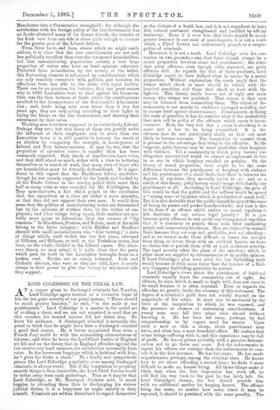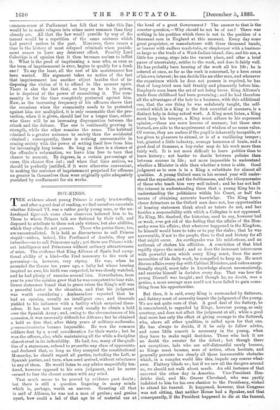LORD COLERIDGE ON THE PENAL LAW.
AT a supper given to discharged criminals last Tuesday, Lord Coleridge again insisted on a favourite topic of his, the too great severity of our penal system. "There should be much greater leniency," he said, "in the scale of our punishments." Lord Coleridge is a master in the useful art of evoking a cheer, and we are not surprised to read that on this occasion his wonted success did not desert him. He knew his audience. A discharged criminal is naturally dis- posed to think that he might have been a discharged criminal a good deal sooner. He is better acquainted than even a French Jury could be with the extenuating circumstances of his case ; and when he hears the Lord Chief Justice of England set his seal on the theory that in England offenders against the law receive very hard measure, his satisfaction necessarily finds voice. In the irreverent language which is habitual with him, he "gives the bloke a cheer." To a kindly and sympathetic person like Lord Coleridge, popularity, even among discharged criminals, is always sweet. But if the temptation to prophesy smooth things is thus irresistible, the Lord Chief Justice would be better away from such gatherings. True as it may be that Lord Coleridge, as Mr. Montague Cookson said, is much happier in attending them than in discharging his sterner judicial duties, it is a happiness he ought strictly to deny himself. Criminals are seldom disinclined to regard themselves as the victims of a harsh law, and it is not expedient to have this natural sentiment strengthened and justified by official testimony. Even if it were true that there should be much greater leniency in our scale of punishments, it is not a truth which a Chief Justice can conveniently preach to a congre- gation of criminals.
Moreover, it is not a truth. Lord Coleridge rests his con- tention on two grounds,—one that there should always be a moral proportion between crime and punishment ; the other that petty offences, even though often repeated, are petty offences still. As regards the first of these positions, Lord Coleridge ought to have defined what he means by a moral proportion. Without explanation, the words imply that the crimes which shock us most should be visited with the heaviest penalties, and those that shock us least with the lightest. This theory really leaves out of sight one main reason why crimes are punished. That reason is that men may be deterred from committing them. The object of the community is not merely to vindicate outraged morality, but to ensure itself against inconvenience. Consequently, in fixing the scale of penalties it has to consider what is the probability that men will be guilty of the offences which cause it incon- venience. Now, the very fact that a crime is shocking is in some sort a bar to its being committed. It is the offences that do not particularly shock us that are most likely to become common. The temptation to commit them is present in the advantage they bring to the offender. In the long-run, petty larceny may be more profitable than burglary with violence. Yet a community in which petty larceny was altogether unrestricted would be almost as unpleasant to live in as one in which burglary entailed no penalty. On the theory of moral proportion, there ought to be the same difference between the punishment of burglary with violence and the punishment of a small theft, that there is between the degrees of repulsion they severally excite in us ; and as a result of this theory, petty larceny woul I escape with hardly any punishment at all. According to Lord Coleridge, the gain of this would be that the public and the sufferer would be spared a "strong sense of injustice which is productive of much evil."
But it is also desirable that the public should be spared the sense of losing its purses and pocket-handkerchiefs ; and how is this to be done if an offence which excites no moral repulsion is left destitute of any serious legal penalty ? It is just because petty offences do not excite any strong moral repulsion that it is necessary to punish them with what unthinking people call unnecessary harshness. Men are induced to commit them because they are e nay and profitable, and not shocking ; and as we cannot make them difficult, or lessen the receipts from them, or invest them with an artificial horror, we have no choice but to punish them with at least moderate severity.
The legal penalty takes the place of the sanctions which in other cases are supplied by circumstances or by public opinion. If Lord Coleridge's plan were tried, the law forbidding theft would become of little more value than the bye-law of a Rail- way Company forbidding gratuities to porters.
Lord Coleridge's views about the punishment of habitual criminals equally leave the community out of sight. An offence, he says, which is small to begin with does not cease to be small because it is often repeated. Even as regards the offender, we greatly doubt the accuracy of this statement. The degree of a criminal's guilt does not wholly depend on the magnitude of his crime. It must also be measured by the force of the temptation to which he was exposed, and
the presence or absence of restraining considerations. A young man may fall into crime once almost without knowing it. He has been led away, perhaps, by bad companionship, or by urgent need for money. Upon such a man as this, a sharp, short punishment may have, and often has, a most beneficial effect. He realises that crime brings suffering with it, and this experience may be full of profit. He leaves prison probably with a genuine determi- nation not to go there any more. But the inducements to repeat his offence are stronger than the inducements to com- mit it in the first instance. He has lost caste. He has made acquaintances, perhaps, among the criminal class. He knows how to set about offending a second time ; he finds it more difficult to make an honest living. All these things make it likely that when the first impression has worn off, he will find his way back to the gaol he has lately left. On Lord Coleridge's theory, the law should provide him with no additional motive for keeping honest. The offence being the same, no matter how many times it may be repeated, it should be punished with the same penalty. The - common-sense of Parliament has felt that to take this line would be to make relapses into crime more common than they already are. All that the law would provide by way of de- terrent would be a repetition of the same sentence which had proved useless in the past. Moreover, there comes a time in the history of most relapsed criminals when punish- ment ceases to have any deterrent effect. Possibly Lord Coleridge is of opinion that it then becomes useless to inflict it. What is the good of imprisoning a man who, as soon as the term of imprisonment is over, begins to qualify for a fresh one? To say the least, all the cost of his maintenance has been wasted. His argument takes no notice of the fact that imprisonment has another object besides that of in- disposing the victim of it to offend in like manner again. There is also the fact that, so long as he is in prison, he is deprived of the power of committing it. The com- munity is for the time completely protected against him. Now, as the increasing frequency of his offences shows that the occasions when the community needs to be protected against him are multiplied, it is only reasonable that the pro- tection, when it is given, should last for a longer time, other- wise there will be an increasing disproportion between the attack and the defence. The one is -continually growing in strength, while the other remains the same. The habitual criminal is a greater nuisance to society than the accidental criminal ; consequently, there is nothing unreasonable in arming society with the power of setting itself free from him for increasingly long terms. So long as there is a chance of the offender's reformation, we leave him free to turn that chance to account. By degrees, in a certain per-centage of cases, this chance dies out ; and when that time arrives, we should be perfectly justified, if it were otherwise convenient, in making the sentence of imprisonment perpetual for offences no greater in themselves than were originally quite adequately punished by confinement for six weeks.







































 Previous page
Previous page